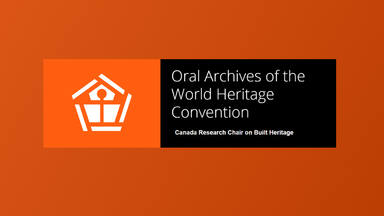
Interview
Hans Caspary
World Heritage Convention
Hans Caspary studied history, archeology and art history at the University of Munich. From 1966 to 2001, he had a long career as a curator of historical monuments in Mainz for the state of Rhineland-Palatinate, one of the federal states of Germany today.
In this capacity, he participated in the meetings of the World Heritage Committee from 1983 to 2001 as an expert in cultural heritage for the German delegation. Until the unification of Germany in 1990, he occupied this function alone. At the fourteenth session of the World Heritage Committee in Banff that year, a second representative of the former German Democratic Republic symbolically joined him in order to jointly propose the site of the Palaces and Parks of Potsdam and Berlin for inscription. Hans Caspary is also a long-time collaborator of ICOMOS, for which he has carried out several evaluations and monitoring missions for cultural property in Eastern Europe.
He is the author of several German publications on the architecture of the Rhineland-Palatinate and, more recently, of a catalogue on the Churches of Peace in Jawor and ?widnica, a German-Polish heritage: Die schlesischen Friedenskirchen in Schweidnitz und Jauer. Ein deutsch-polnisches Kulturerbe (Deutsches Kulturforum östliches Europa, 2005).
Interview with
Hans Caspary
1st July 2011, Mainz, Germany
The following audio excerpts are from an interview with Hans Caspary by Christina Cameron and Mechtild Rössler the 1st July 2011 in Mainz, Germany. He provides an enlightened personal view on the mechanisms and challenges of the Convention, the political dimension of the Committee's work and the performance of the Advisory Bodies, IUCN and ICOMOS. He also makes some interesting remarks concerning the conduct of States parties, specifically with regard to Germany.
- 1. The World Heritage Convention
- 1a. Involvement and role of Hans Caspary in the Convention
- 1b. Main objectives of the Convention
- 1c. The World Heritage List: length and representativeness
- 1d. Decisions and decisive cases for the implementation of the Convention
- 1e. Successes and failures of the Convention
- 2. The World Heritage Committee: balance between professionals and diplomats
- 3. Advisory bodies: ICOMOS and IUCN
- 4. The conduct of States parties at the national and international level
Oral Archives of the
World Heritage Convention
Under the leadership of the Canada Research Chair on Built Heritage at the University of Montreal, an international team of researchers conducts interviews with pioneers of World Heritage to capture memories of important moments in the history of UNESCO Convention.
Launched in 2006, this initiative is part of the UNESCO History project that celebrated the 60th anniversary of the creation of UNESCO. The Oral Archives project records the precious witness of people closely associated with the creation and implementation of the Convention. Their recollections and views have greatly enriched the book by Christina Cameron and Mechtild Rössler, Many Voices, One Vision: The Early Years of the World Heritage Convention (Ashgate/Routledge, 2013).
